October 31, 2025


When it comes to owning a mobile home park, it’s a no-brainer that the park’s profitability and day-to-day activities should be your top priority. However, as I talk to park owners across the country, I find very few who ever give a thought to their exit strategy until the moment they’re ready to sell.
At this point, you may be asking yourself, if I’m not planning to sell anytime soon, why on earth do I need an exit strategy? It’s a legitimate question.
In my opinion, having an exit strategy to sell your park (even if that isn’t today) is smart in two ways.
First, it helps create a road map on how you choose to manage your park’s operation and finances as you enjoy all the rewards park ownership has to offer.
Second, it helps keep your park ready for a sale in the event the right buyer or market conditions suddenly come along, or God forbid, something happens to you and your family decides to sell.
While I’m talking to park owners ready to sell, there are several key points of the discussion that make it easy to see which owners have a true exit strategy and which don’t. So, let’s dive into two of the more obvious ones.
One of the significant advantages of owning a mobile home park is the wide range of tax deductions available to owners. However, many unprepared park owners often mix personal expenses with their park’s expenses in an attempt to reduce their tax burden.
Over the years, I have encountered instances where clothing, vehicles, and even family vacations labeled as “business trips” have beeni ncluded in the tax returns of a park.
While these types of expenses can momentarily lower their taxes, they can also significantly affect the market value of the park.
This is particularly true if there is more than three years of commingling, as it creates an expense pattern on the park's tax filings. A pattern that can often be difficult to explain and even prove, to a potential buyer.
As an owner, the better approach is to make yourself an employee of your company and utilize as many of those types of deductions as your CPA feels comfortable with on your personal income tax filing.
While I’m not in favor of simply jacking up rent rates every year because the park’s occupants have no other choice than to live in the park, I’m also amazed at how far behind many park owners allow their parks to become compared to their area’s market rates.
When I ask these owners why the park's rents are so low, many times I hear one of two reasons. Either the park owner didn’t raise rates during the COVID years to help their tenants, or their tenants didn’t cause problems, so they didn’t raise rates in an effort to keep them over the long haul.
In my honest opinion, no matter what the reason I’m given, it simply boils down to the park owner becoming “comfortable” with their park's income which allows the owner to live a lifestyle they're happy with.
Being a prior park owner, I certainly understand wanting to look out for your tenants and how things can become pretty comfortable once the park has been stabilized.
However, because a park’s revenues are directly tied to its market value, owners who fall behind market rates are potentially setting themselves and their tenants up for financial disaster in a couple of ways.
First, if an owner has a set price in their mind, but the revenues don’t support it, many times the tenants are subjected to larger rate increases over a short period of time.
Now, rather than the owner having happy tenants that are loyal to the park, the owner has tenants that tend to demand more, or may even decide they can no longer live in the park while it’s being marketed for sale. This can be disastrous to a the sale, the seller, and the tenants.
Alternatively, let’s say the park owner decides to sell the property at a price reflecting the lower revenues. More than likely, the buyer will make significant rate adjustments immediately after acquiring the property, in an effort to quickly elevate their income.
In either situation, the tenant's financial burden is suddenly much bigger than if a small rate increase were initiated each year.
As a park owner, it’s easy to think that the selling price you have in mind is the price buyers will pay, since the mobile home park market is hot right now.
However, it's important to remember that there are roughly 30,000 mobile home parks in the U.S. So when it does come time to sell your park, if it doesn’t check all the buy boxes, buyers will move on to another deal pretty quickly.
The good news is it’s never too late to start working on your park’s exit strategy, even if you have a few more years of ownership in mind. As a matter of fact, the more the better!
If you would like help developing your exit strategy from someone who understands park ownership, the market, and what buyers are looking for, give me a call at 402-615-9165 for a free consultation. I’m always happy to help, and sometimes even the simplest of conversations can make all the difference.



Find this article interesting? Be sure to check out our other recent articles to read about the latest news, events, market insights, and more from the prespective of Mid-Plains Land & Realty.